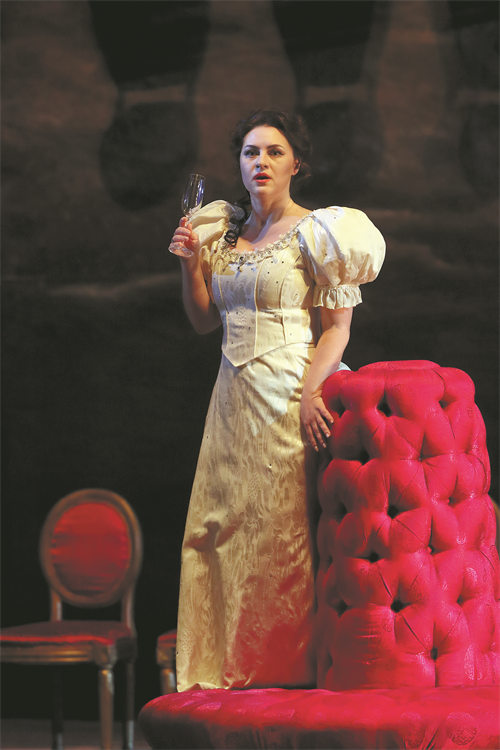

According to Gimadieva, Violetta has a particular effect on sopranos due to challenges and demands. Her first encounter with the character was in a DVD of a performance at the Salzburg Festival when she was a student at the St. Petersburg Conservatory. She found her instantly compelling.
In 2011, she made her debut as Violetta in a production of La Traviata by the Bolshoi Theatre in Moscow. Since then, it has become one of her signature roles. She has performed at prestigious opera houses and venues across Europe and the United States, including the Royal Opera House in Britain and the Opera National de Paris in France, and made her US debut with the Los Angeles Philharmonic Orchestra.
"I always find new challenges, new pleasures and new experiences in playing the role. Violetta is so complicated and charming. She loves desperately, and she is capable of self-sacrifice," says Gimadieva.
For this run in Beijing, she is performing with longtime friend, Shi Yijie, the tenor playing Alfredo.
In an earlier interview, Shi, who graduated from the Toho College of Music in Japan, said he had been preparing for the role for over a decade.
In 2010, the NCPA premiered its production of La Traviata, with German director Henning Brockhaus and legendary French-American conductor Lorin Maazel. Known for his exceptional vocal talent — he had previously wowed audiences with his high C notes — Shi made his debut as Alfredo in 2019 for the NCPA's fifth round of performance of its production of La Traviata.
"It was a special milestone for me when I took on the role for the first time," Shi, 42, says. "Aging has benefited my voice. Compared to 2019, it is much more mature now. As I get older, my voice develops depth and richness."
Shi adds that over the years, he has refined his technique through consistent practice and performance, giving him greater control.
La Traviata is significant in the context of Chinese opera history. In 1956, the China National Opera House staged an all-Chinese production at Beijing's Tianqiao Theater, making it one of the first Western operas to be performed on a Chinese stage.
Since then, it has become one of the most beloved and familiar Western operas to Chinese audiences. Its enchanting melodies, especially the famous duet Libiamo ne' lieti calici ("Let us drink from joyful cups"), resonate deeply with the public.